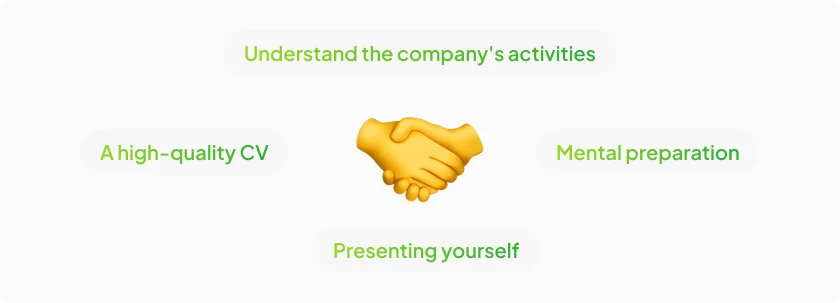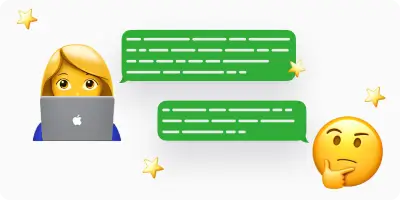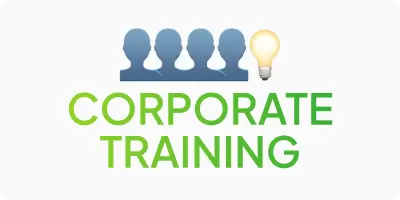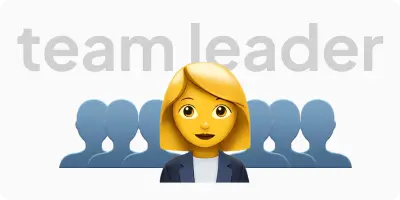
When a person starts looking for a job, he or she faces one of the stages of this process – an interview. For almost everyone, this is a very stressful situation that forces us to step out of our comfort zone. But this is only at first glance. If you have the right attitude and use some tricks, it turns out that the interview is just another step towards the realization of your goals.
So today, let’s dispel the unpleasant impression of the hiring process and turn it into a pleasant conversation with useful experience.
What is an interview?
First of all, let’s make it clear that a job interview is not an exam or a school test. In fact, the interview is a two-way communication, during which not only the employer evaluates you as a potential employee, but you also have the opportunity to understand whether this company and position are suitable for you.
To worry less, there is one effective method – to prepare for the interview. This gives you more confidence in yourself and your knowledge. After all, you already tune in to a productive dialogue and know what to expect. Moreover, your interlocutor is the same person as you, who understands that there are no ideal candidates. The main thing is to be yourself and show your best qualities and skills.
How to prepare for the interview?
The interview is stressful not only for you, but also for the HR manager or employer. They want to find the best candidate for the vacancy, which is why they conduct a thorough selection.
Understand the company’s activities
If you do not know what the company does, where you want to work, then why do you go there? Therefore, before the interview, find an hour or two to do a little research:
- What does this company do? What services do they provide?
- What basic values and principles does the company promote in its appeal to customers?
- What about this company write on the Internet? What are the reviews?
A clear wording of the answers to such questions will help you arouse interest in the employer. And for yourself, you form a clear understanding of whether this company is right for you.
Lifehack: Check your online footprint by entering your full name in the search term. Make sure that you are not left with bad reviews or compromising information.
A high-quality CV
The first thing employers look at when hiring is your CV (curriculum vitae) or resume. In these documents, you provide a concise and structured written chronology of your life or career development (depending on the type of document), that is:
- First and Last Name.
- Your specialization.
- What you graduated from: school, college, university, courses; Specify the years of study.
- If there is, then experience: where you worked, what time you worked, your position.
- Soft skills – that is, your character traits.
- Hard skills are skills and knowledge that are necessary at work.
- Specify your achievements and goals. It sets you apart from the candidates.
- It is important to specify contacts for feedback (phone, mail, telegram, link to the portfolio). It is desirable that the contacts are clickable.
When you have already understood the specialization of the company, you should personalize your resume.
For example, when studying the job description, pay attention to the key requirements, responsibilities, and skills. Or more specifically, highlight your experiences and achievements that most fit the job requirements.
Lifehack: Use in your resume the same keywords and phrases that are indicated in the description. This helps HR or the employer to make sure that you are a more suitable person for this vacancy.
Presenting yourself
The first thing you will be asked to do during the interview is to tell a little bit about yourself. You have a few minutes to present yourself in the best way possible and make the HR manager interested. This is a difficult task if you don’t think about your answer in advance.
First, prepare specific examples of your achievements that demonstrate your value as a specialist. You can use the STAR (Situation, Task, Action, Result) method to structure your answers to questions about your experience. Describe the specific situation, the task at hand, the actions you took, and the results you achieved. This will help the employer better understand your potential.
Second, show your motivation and enthusiasm. Tell them about your plans for the future, not about going to the movies, but about how you want to develop and improve your skills or acquire new ones. This will show the employer that you are not resting on your laurels and are willing to do your best to improve your work.
And finally, be ready to talk about your weaknesses, because every person has them. Don’t be afraid to recognize their existence, but focus on the fact that you are working on your shortcomings and strive for self-improvement.
For example, you can beautifully beat your pickiness to the details. Emphasize that you carefully check everything several times and spend a little more time because of this. However, as a result, you hand over a good job.
Lifehack: Don’t be afraid to be frank, because it is sincerity that can help win the trust of the employer and convince him to choose in your favor.
Mental preparation
It is important to understand that excitement is normal for any person. However, excessive anxiety can be bad for your health. Especially because of stress, you can forget even how old you are or what your name is. It sounds funny, but it’s true.
Calm down, take a few deep breaths and exhales. Before the interview, take up your favorite hobby, go out into the fresh air, think about something pleasant or share your worries with loved ones. Such banal things can help you relax and recover.
Lifehack: Visualize the successful outcome of the interview. Imagine yourself confident, calm and competent when talking to your employer. Positive thinking will help to tune in the right way.
How to behave during the interview?
It does not matter whether the interview takes place online or in the office, you should think about the first impression you leave on HR or the employer.
- Listen carefully to the question and make sure you understand its essence. If necessary, ask for clarification or rephrase questions to make sure of the correct understanding.
- Answer clearly, concisely and in essence. Avoid excessive detail or deviation from the topic. Focus on the key aspects of your experience that most fit the job requirements.
- Maintain eye contact with the interviewer and control your facial expressions. Make eye contact when listening to and answering questions, smile genuinely, and sit up straight. This demonstrates your confidence, honesty, and engagement in the conversation.
- Keep your outfit tidy and clean. Make sure your clothes are ironed and free of stains and holes. This will show your attention to detail and seriousness.
- If the interview takes place online, make sure you have a stable Internet connection and a quiet corner where you won’t be distracted. If you know that something might interfere with your interview, you should warn the interviewer about the inconvenience.
10 most common interview questions
Your goal during a hiring process is not just to answer questions, but to convince the employer that you are a good fit and valuable to the company. Therefore, prepare and practice answers to common questions in advance to feel confident and relaxed during the interview.
- What exactly interested you in this vacancy or our company?
- What do you pay attention to when choosing a company? Do you have certain criteria?
- What was the reason for dismissal from the previous job?
- What motivates/demotivates you in your work?
- Tell us about the most difficult case you faced in your previous position, and how do you solve the problem? What experience or lesson have you learned from this situation?
- Share your successes in the past? What achievements are you proud of?
- Give an example of a conflict situation that you faced in interaction with your colleagues, management, clients: what were the reasons, how did you decide what was achieved?
- What will you do if you get a new task for which you lack experience or time? What are your next actions?
- Imagine and describe your ideal working day.
- In what professional direction do you strive to move and what areas are you interested in for further growth? What knowledge and skills do you plan to develop to reach new heights in the future?
As you can see, the questions are generally about your work experience and about challenging situations you may have faced. Answers to these questions will help the HR manager better understand your soft and hard skills and how they fit into the job.
Questions to ask and things not to say
An interview is a two-way process, so it’s important not only to answer questions but also to ask the employer questions. This will help you better understand the company, the position, and the expectations, and demonstrate your sincere interest and preparation. Here are some tips to help you formulate effective questions:
Ask about the key duties and responsibilities of the position.
Example: “What will be my main responsibilities and priorities in this position for the first 3-6 months?”
Ask about opportunities for professional development and career advancement in the company.
Example: “What training and professional development opportunities do you offer your employees? Does the company have mentoring programs or individual development plans?”
Ask about the corporate culture, values, and work environment.
Example: “How would you describe the corporate culture and work environment in your company? What values are key to your organization?”
Ask about the next steps in the selection process and the expected timeline for feedback. Example: “What are the next steps in the selection process after this interview? When can I expect feedback from you?”
Don’t forget that there are topics that should not be mentioned during the interview. For example, complaining about your last job or employer. Show restraint and wisdom when speaking about your previous experience, or argue from a professional point of view what you didn’t like in the past. You should also not complain about personal problems, because an interview is not a psychologist’s appointment.
Lifehack: Stay professional, focused on the position and your skills, and avoid controversial or inappropriate topics. This will help you make the best impression.
Conclusion
Remember that job search is a process that requires patience and perseverance. Don’t give up after the first failure. And our tips and examples will help you create your perfect resume and prepare for the interview. Be flexible and adaptable to different situations, don’t be afraid to be creative, and you will succeed!












